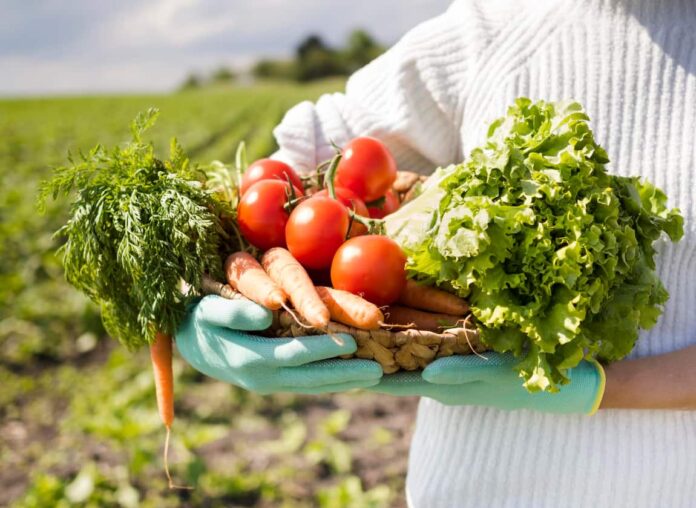The “organic” label has become a familiar sight in grocery stores and on product packaging. But what exactly does it mean? Is ỏganic truly worth the extra cost? This comprehensive guide delves into the world of organic products, explaining the concept, its potential benefits, and how to navigate the choices available to you.
Demystifying “Organic”: Understanding the Practices
Organic refers to a specific set of agricultural practices that prioritize:
- Environmental Friendliness: ỏganic farmers avoid synthetic pesticides and fertilizers, opting for natural methods to protect crops and promote soil health. This reduces pollution and conserves natural resources.
- Animal Welfare: Organic livestock are raised in humane conditions with access to the outdoors and organic feed, minimizing the use of antibiotics.
- Absence of Synthetic Additives: Organic food products are free from artificial colors, flavors, and preservatives.
Here’s a breakdown of key terms related to organic:
- Synthetic pesticides and fertilizers: These are man-made chemicals used to control pests and boost plant growth.
- Genetically Modified Organisms (GMOs): These are organisms that have had their genetic makeup altered in a lab. Organic products cannot contain GMOs.
- Antibiotics: Organic farms typically limit the use of antibiotics in livestock to prevent antibiotic-resistant bacteria.
Unveiling the Benefits of Organic Choices
There are several compelling reasons to consider incorporating organic products into your lifestyle:
- Potential Health Advantages: Some studies suggest that organic food may contain higher levels of certain antioxidants and nutrients compared to conventionally grown food. Additionally, avoiding synthetic pesticides and antibiotics may have long-term health benefits.
- Environmental Advantages: Organic farming practices contribute to a healthier ecosystem by promoting biodiversity, improving soil health, and reducing water pollution.
- Animal Welfare Concerns: Organic animal farming prioritizes the well-being of livestock, providing them with a more natural and humane living environment.
Here’s a table summarizing the potential benefits of organic products:
| Benefit | Explanation |
| Potential health benefits | May contain higher levels of nutrients and antioxidants, avoids synthetic pesticides and antibiotics |
| Environmental advantages | Promotes biodiversity, protects soil health, reduces water pollution |
| Animal welfare concerns | Provides better living conditions for livestock |
drive_spreadsheetExport to Sheets
ỏganic vs. Conventional: Weighing the Options
While organic products offer numerous benefits, it’s important to consider some factors:
- Cost: Organic products are generally more expensive than conventionally grown food due to the higher labor costs associated with organic farming practices.
- Availability: Organic options might be limited in certain areas, especially in smaller grocery stores.
- Not Always a Guarantee of Absolute Health: The “organic” label doesn’t necessarily equate to completely healthy. Organic products can still be high in sugar and calories, so reading food labels remains crucial.
Navigating the Organic Aisle: Making Informed Choices
Here are some tips for making informed choices about organic products:
- Prioritize Your Concerns: Decide which aspects of organic farming resonate most with you – health, environment, or animal welfare. Align your choices with your priorities.
- Embrace Local and Seasonal: When possible, choose organic fruits and vegetables that are in season and grown locally. This can often be more affordable and environmentally friendly.
- Seek Certification: Look for the USDA Certified Organic label on food products to ensure they meet strict government standards.
- Conventional Can Be Healthy Too: If organic isn’t always an option, conventionally grown produce is still a healthy choice. Wash all fruits and vegetables thoroughly before consuming.
FAQs
Are organic products truly pesticide-free?
Organic products cannot contain synthetic pesticides. However, they may use some naturally derived pesticides, which are considered to be less harmful to the environment.
Do organic products have a longer shelf life?
Organic produce typically has a shorter shelf life due to the absence of preservatives. Proper storage is essential for maximizing freshness.
Are organic cotton clothes worth the extra cost?
Organic cotton production uses less water and avoids harmful chemicals. If sustainability is a concern for you, organic cotton clothing might be a worthwhile investment.
Can I trust the “organic” label?
The USDA Certified Organic label ensures products meet strict regulations. Look for this label on food products to guarantee authenticity.
Conclusion
Choosing ỏganic products is a personal decision. While they offer potential health and environmental benefits, consider your budget and priorities before making a switch. Remember, even small changes can make a difference. By supporting organic practices when possible, you contribute to a more sustainable future for our planet and its inhabitants.



